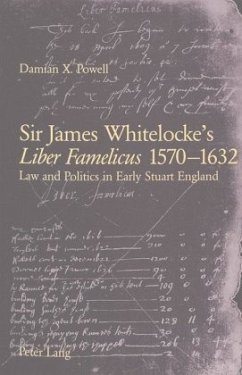Sir James Whitelocke (1570-1632) was one of the most distinguished and politically intriguing figures of his age. His Liber Famelicus , compiled over the course of a long and controversial career as parliamentarian and judge, offers extraordinary insights into religion and politics in an age not noted for its political candour.
Whitelocke's early political theories on the king-in-parliament, and later judicial pronouncements on Crown legal rights, presage constitutional issues facing parliament and the Crown in 1642. A study of Whitelocke's life sheds valuable light on the character and causes of constitutional disagreement before the Civil Wars. This book explains Whitelocke's political views, exploring the place of law in seventeenth-century political thought. It questions his dual formation in English and civil law, his colourful and controversial years in the parliament and the courts of law, and his professional connections with such powerful figures as Archbishop William Laud. The result is a much-needed case study of a figure whose views defy simple explanations, illuminating the salient questions facing the English political nation in the early Stuart era.
Whitelocke's early political theories on the king-in-parliament, and later judicial pronouncements on Crown legal rights, presage constitutional issues facing parliament and the Crown in 1642. A study of Whitelocke's life sheds valuable light on the character and causes of constitutional disagreement before the Civil Wars. This book explains Whitelocke's political views, exploring the place of law in seventeenth-century political thought. It questions his dual formation in English and civil law, his colourful and controversial years in the parliament and the courts of law, and his professional connections with such powerful figures as Archbishop William Laud. The result is a much-needed case study of a figure whose views defy simple explanations, illuminating the salient questions facing the English political nation in the early Stuart era.
"...ein interessanter Beitrag zur englischen Geschichte des 17. Jahrhunderts, der eine Annäherung an die Konflikte der frühen Stuart-Herrschaft in der Perspektive eines in die politische Arbeit der Zeit auf höchst vielschichtige Weise eingebundenen Juristen zeigt." (Helga Schnabel-Schüle, Ius Commune)
"Organised around Sir James Whitelocke's well-known commonplace book 'cum' diary, 'Liber Famelicus', Damian Powell's study is based on extensive archival research and adds significantly to our knowledge of the relationship between law and politics in early seventeenth-century England. Working his way carefully between the extremes of old Whig and newer 'revisionist' interpretations of constitutional conflict in the period, Powell shows how Whitelocke could argue, on the one hand, for parliamentary limits on royal authority in the famous impositions debates of 1610 while, on the other, defending the right of the crown to punish MPs who spoke against royal policies when he was a judge in the later 1620s.
Unusual in that he was educated in Roman civil law at Oxford University as well as in common law at the Middle Temple in London, Whitelocke was also a member of the Society of Antiquaries, an informal association of learned men who presented papers on historical topics. In addition to tracing his career through these institutions, Powell discusses Whitelocke's professional advancement in terms of the impact of patronage on the Jacobean judiciary while at the same time illuminating his family life and his activities in the localities. The book is a welcomed contribution to the history of the legal profession during a period in which its importance in national life was probably unprecedented." (Christopher Brooks, History Department, University of Durham)
"Organised around Sir James Whitelocke's well-known commonplace book 'cum' diary, 'Liber Famelicus', Damian Powell's study is based on extensive archival research and adds significantly to our knowledge of the relationship between law and politics in early seventeenth-century England. Working his way carefully between the extremes of old Whig and newer 'revisionist' interpretations of constitutional conflict in the period, Powell shows how Whitelocke could argue, on the one hand, for parliamentary limits on royal authority in the famous impositions debates of 1610 while, on the other, defending the right of the crown to punish MPs who spoke against royal policies when he was a judge in the later 1620s.
Unusual in that he was educated in Roman civil law at Oxford University as well as in common law at the Middle Temple in London, Whitelocke was also a member of the Society of Antiquaries, an informal association of learned men who presented papers on historical topics. In addition to tracing his career through these institutions, Powell discusses Whitelocke's professional advancement in terms of the impact of patronage on the Jacobean judiciary while at the same time illuminating his family life and his activities in the localities. The book is a welcomed contribution to the history of the legal profession during a period in which its importance in national life was probably unprecedented." (Christopher Brooks, History Department, University of Durham)

